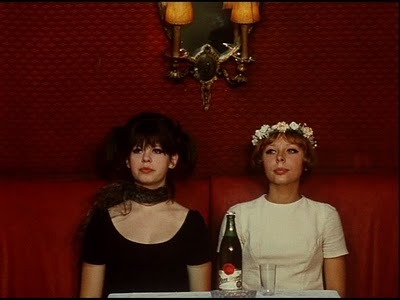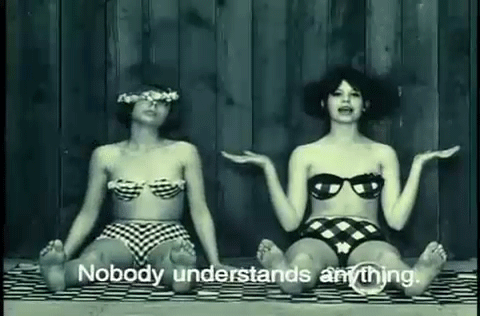Daisies (Czech: Sedmikrásky) is a 1966 Czech film directed by Věra Chytilová considered a milestone of the Nová Vlna movement and the modern surrealist cinema.
Made with the support of the state-sponsored film studio, it follows two teenage girls, both named Marie, played by Ivana Karbanová and Jitka Cerhová; throughout the film they engage in strange pranks as acts of rebellion against the world in which they live.
Innovatively filmed, and released a couple of years before the Prague Spring, Daisies was labeled as "depicting the wanton" by the Czech authorities and then banned. Director Chytilová was forbidden to work in her homeland until 1975.
http://en.wikipedia.org/wiki/Daisies_(film)
Chytilová has set herself against the notions of mainstream cinema and produced a new kind of record thanks to which she has been able to revise and re-imagine the category of femininity, a category that has been always described in terms of traditional gender interpretations. Despite formal and ideological difficulties, Chytilová developed in Sedmikrásky a subjective vision, filled with a sense of irony and humour, of the painful adolescence of two "spoiled" (zkažené) girls, Marie I and Marie II, who are trying to act out their lives. The unconventional plot revoles around a series of unconnected escapades as the two girls use their femininity and mock naivity to run rings around a succession of older men. The audacity of their rebellious spirit culminates in a spectacular food fight in a hall, laid out in advance for a grand banquet. After this, the two promise to mend their ways and make attempts to repair the damage they have done.
Małgorzata Radkiewicz
http://www.kinoeye.org/02/08/radkiewicz08.php
On the surface, Daisies’ assemblage of outlandish scenarios enacted by two ferociously antiestablishment figures would seem to mark it as simple anarchic slapstick, like a New Wave Marx Brothers comedy. But Chytilová has called her film “a philosophical documentary in the form of a farce.” The Maries are not merely railing against a society that views them as little more than objects (in the opening scene, Marie II calls herself a panna, which translates as both “doll” and “virgin” in Czech, and the girls play with, and at one point remove, their limbs as though they were the plastic appendages of mannequins); they are also existentially angry. Early on, they decide the world is meaningless, “spoiled,” which they use as justification to spoil themselves. By refusing to cultivate a psychological connection between audience and character, and by confounding any sense of narrative momentum, Chytilová and her screenwriting partner Ester Krumbachová create protagonists who seem to have no future or past. Blank slates, they have been interpreted over the years variously as embodiments of healthy rebellion and the banality of evil. Either way, they are good representations of Chytilová’s belief that “people are primitives and aesthetes at the same time.”
Though Daisies remains playful to its climactic orgy (a mega food fight), it is ultimately a dark, subversive work, aggressively critiquing those who might find it offensive before they even have a chance to complain: its closing dedication is to people who “get upset only over a stomped-upon bed of lettuce,” over the sounds of firing artillery.
Michael Koresky
http://www.criterion.com/current/posts/2269-eclipse-series-32-pearls-of-the-czech-new-wave
After a few minutes of the film’s free, unpredictable energy you see
what made people nervous. The two young women turn a food-filled banquet
table into a catwalk, prank older male suitors on humiliating dates,
and get drunk at a nightclub and upstage its performers. They lounge
half-dressed in their green-accented flat, the walls covered with phone
numbers and flower engravings, munching on pickles and sparring
playfully in singsong tones.
Their creativity and destructiveness are “two sides of the same coin,”
Ms. Chytilova said in an interview during the 2002 Prague on Film
Festival in London. The twinned heroines — one blonde and laureled like a
nymph, the other a taller brunette — act like dolls run amok, but
they’re also impish adolescents tweaking society through their
experiments in self-definition. “We can try anything once,” they exclaim
in their existential repartee.
But especially amid the flux of 1960s Czechoslovakia their free-spirited
activity was open to unsettling interpretations. Do their games
represent the dangers of idleness and ideological shapelessness, or do
the women personify a punklike liberation? And what to make of the
archival war footage that opens and closes the film?
“It’s very ambiguous!” Michal Bregant, director of the National Film
Archive in Prague, wrote in an e-mail. “It looks like an anarchist
statement, but the director wanted to warn what might be the
consequences of irresponsible human behavior.”
Nicolas Rapold




No comments:
Post a Comment